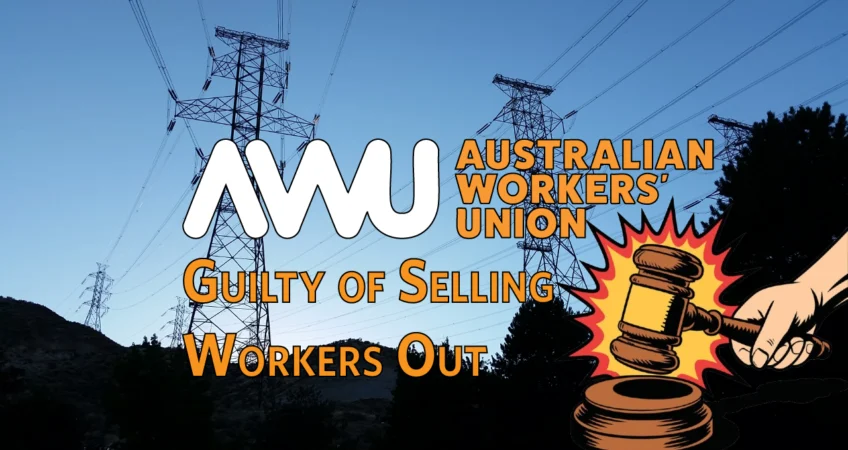In a dramatic win for workers and their rights, the militant Electrical Trades Union (ETU) has successfully taken Spanish contractor Elecnor to court over unlawful union access denials, exposing yet another instance of the Australian Workers Union (AWU) siding with employers at the expense of workers’ pay and conditions.
The Federal Court ruled that Elecnor breached right of entry laws on the $3.8 billion EnergyConnect transmission project in south-west New South Wales. The court found the company had denied the ETU access to 47 line workers on “specious, if not disingenuous” grounds, despite the union having legal rights to represent them.
The workers, most of whom are employed through labour hire firm Catalpa Energy, were blocked from speaking with their union for over two years. Elecnor’s refusal was part of a broader strategy to sideline the ETU and lock workers into a deal struck with the more employer-friendly AWU.
The AWU, which had an agreement in place with Elecnor, was exposed in the court ruling as having no valid claim to sole representation on the site. Despite that, the AWU had positioned itself to keep wages lower and restrict more militant representation from the ETU. The court confirmed the ETU, not the AWU, had legitimate coverage of much of the workforce – including the linesmen critical to assembling high-voltage transmission towers.
Workers have voiced frustration at the AWU’s role in keeping wages down and blocking genuine representation. Many on-site have rejected joining the AWU, saying the union does deals with management instead of fighting for better pay and conditions. “The AWU doesn’t speak for us – they speak for the bosses,” said one line worker who requested anonymity. “The ETU is our real union. They’re the ones actually fighting for us.”
This legal victory marks a significant turning point in the industrial landscape of Australia’s renewable energy sector, as the ETU pushes to become the dominant union across green energy infrastructure.
“This is a warning to every employer, developer and financier: you will not cut wages, undermine safety, or silence unions in Australia’s energy transition,” said ETU national secretary Michael Wright. “The ETU is here to fight for safe, secure, unionised jobs – not sweetheart deals with management.”
ETU NSW secretary Allen Hicks labelled Elecnor’s refusal to allow union access as “disgraceful” and a deliberate attempt to keep workers isolated from real representation. “Finally, the company has been forced to see sense,” he said.
The ruling is also a major blow to the AWU, which industry sources admit will now struggle to maintain coverage and influence over key roles on major energy projects. The union’s agreements have often been favoured by contractors because they come with lower wage costs, but critics argue that comes directly at the expense of workers’ rights and fair conditions.
With EnergyConnect already suffering a $1.5 billion cost blowout, partly due to Elecnor’s mounting losses, the ruling has triggered fresh debate about the real causes of project delays and budget increases. While some industry figures attempt to blame militant unions for rising costs, experts like Tony Wood from the Grattan Institute say union involvement is not the real issue.
“I’m not seeing anything that is different in the approach by these unions that is contributing much to cost overruns,” Wood said.
Justice Michael Wigney’s judgment made clear that Elecnor had no reasonable basis for its actions and had gone to great lengths to prevent workers from accessing union support. The company even falsely claimed the site was a “residential premises” to avoid scrutiny.
The court will now consider civil penalties against Elecnor, while the ETU has indicated it hopes for a more constructive relationship moving forward – though trust remains badly damaged.
For workers on the ground, however, the message is clear: the ETU is the union fighting for them, and the AWU has once again shown its willingness to do deals with bosses at workers’ expense. The battle over who represents the future of Australia’s green workforce is far from over – but this week, it’s the workers and their union who claimed a decisive victory.
Sources:

